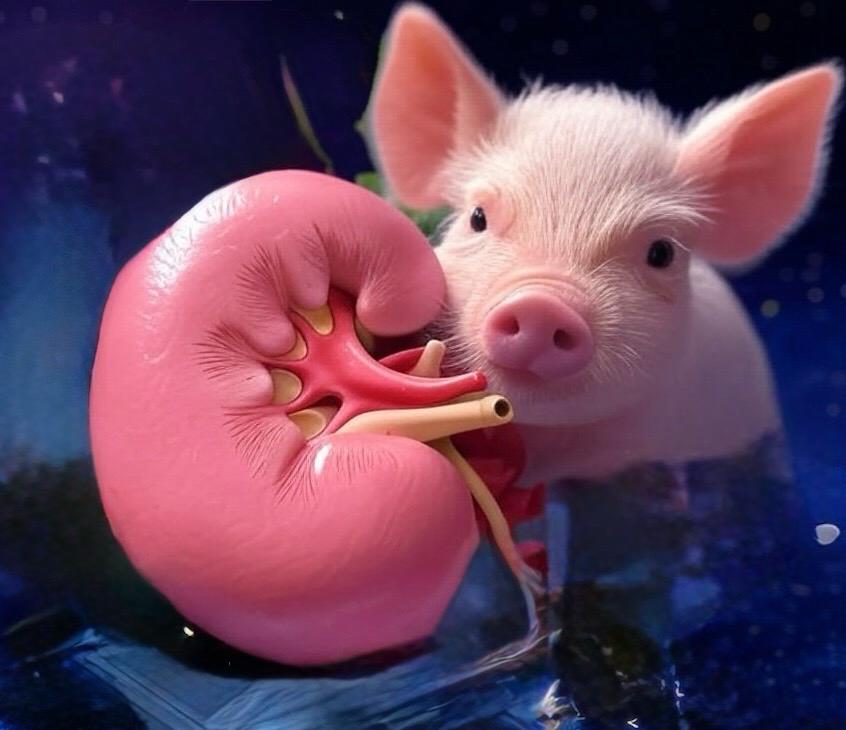By Dr. Marco V. Benavides Sánchez.
In a groundbreaking medical breakthrough, the U.S. Food and Drug Administration (FDA) has approved the first-ever clinical trial to test whether pig organs can be safely transplanted into humans. This trial, focusing on patients with end-stage renal disease, marks a significant step in xenotransplantation—the process of transplanting organs from animals to humans. Scientists hope this innovation will address the severe organ shortage crisis, potentially saving thousands of lives.
The Organ Shortage Crisis
The global demand for organ transplants far exceeds supply. According to the Organ Procurement and Transplantation Network (OPTN), nearly 100,000 people in the United States alone are on the kidney transplant waiting list. Tragically, 17 people die every day waiting for a suitable organ. While advancements in medicine have improved transplantation success rates, the scarcity of donor organs remains a critical challenge. Could genetically modified pig kidneys be the answer?
Why Pigs?
Pigs have long been considered ideal candidates for xenotransplantation for several reasons:
– Organ Size and Function: Pig kidneys are similar in size and function to human kidneys.
– Short Reproductive Cycle: Pigs reproduce quickly, ensuring a stable and renewable organ supply.
– Genetic Modification Possibilities: Advances in gene-editing technology, like CRISPR, allow scientists to modify pig organs to minimize the risk of rejection.
The recent FDA-approved trial will focus on six patients with end-stage renal disease who will receive genetically modified pig kidneys. Unlike previous cases approved on a compassionate-use basis, this study will rigorously monitor the safety and effectiveness of pig organ transplants.
How Does It Work?
For a successful xenotransplant, several modifications are necessary:
1. Genetic Editing: Scientists modify pig genes to reduce the risk of human immune system rejection.
2. Immunosuppressive Therapy: Patients receive medications to prevent their bodies from attacking the new organ.
3. Long-Term Monitoring: The recipients will be closely observed for six months for potential complications and then followed for the rest of their lives.
Success Stories So Far
While this is the first formal clinical trial, previous individual cases have shown promising results:
– In 2021, researchers at NYU Langone Health temporarily transplanted a pig kidney into a brain-dead individual, demonstrating normal function for 54 hours.
– In 2022, a pig heart was transplanted into a living patient at the University of Maryland, though he later passed away due to complications.
– In 2023, two brain-dead individuals were kept heat-beating for more tan a month using pig kidneys.
Each of these cases has contributed to the scientific foundation necessary for this FDA-approved trial.
Potential Risks and Challenges
Despite the promise of xenotransplantation, significant challenges remain:
– Immune Rejection: The human immune system may still reject the pig kidney, despite genetic modifications.
– Viral Transmission: Pigs carry porcine endogenous retroviruses (PERVs), which could theoretically infect humans.
– Ethical Concerns: Some oppose using animals for organ transplants, raising ethical and religious debates.

The Future of Pig Organ Transplants
If this trial succeeds, the implications are monumental:
– More Lives Saved: An unlimited supply of organs could eliminate waiting lists.
– Cost Reduction: Dialysis treatment for kidney failure is expensive; transplants could lower healthcare costs.
– Global Impact: Countries with limited access to human organ donations could benefit immensely.
What Experts Are Saying
According to Dr. Robert Montgomery, who performed the first successful pig kidney transplant into a brain-dead patient, remains optimistic: “With ongoing research and monitoring, xenotransplantation has the potential to become a standard life-saving treatment.”
The FDA’s approval of the first pig kidney transplant trial in humans marks a historic leap forward in medicine. If successful, this innovation could pave the way for a future where no patient dies waiting for an organ. While challenges remain, the potential benefits far outweigh the risks.
Would you accept a pig organ if it meant saving your life? A loved one’s? Let us know your thoughts in the comments below!
Read more about this:
1. Mallapaty, S., & Kozlov, M. (2025). The science behind the first pig-organ transplant trial in humans. Nature, 628, 13-14. https://doi.org/10.1038/d41586-025-00368-w
2. Böhmig, G. A., Diebold, M., & Budde, K. (2024). Opinions on the future of clinical pig kidney xenotransplantation. Transplant International, 37. https://doi.org/10.3389/ti.2024.13475
3. Fang, M., Yang, Y.-G., & Hu, Z. (2024). Current status and challenges of pig-to-human organ xenotransplantation. Science China Life Sciences, 67, 829-831. https://doi.org/10.1007/s11427-023-2500-9
4. Łopata, K., Wojdas, E., Nowak, R., Łopata, P., & Mazurek, U. (2018). Porcine endogenous retrovirus (PERV) – Molecular structure and replication strategy in the context of retroviral infection risk of human cells. Frontiers in Microbiology, 9, 730. https://doi.org/10.3389/fmicb.2018.00730
5. Locke, J. E., Kumar, V., & Anderson, D. (2023). Normal graft function after pig-to-human kidney xenotransplant. JAMA Surg. 2023;158(10):1106-1108. doi:10.1001/jamasurg.2023.2774
#Medmultilingua #Medicine #Xenotransplantation #OrganDonation #Innovation


Leave a Reply